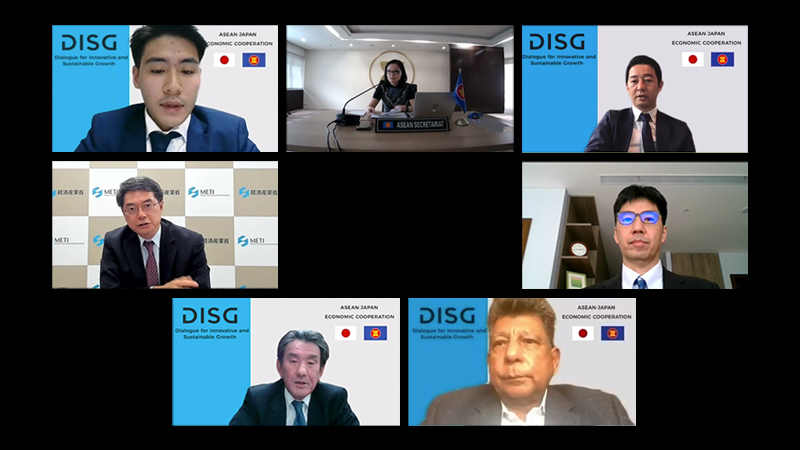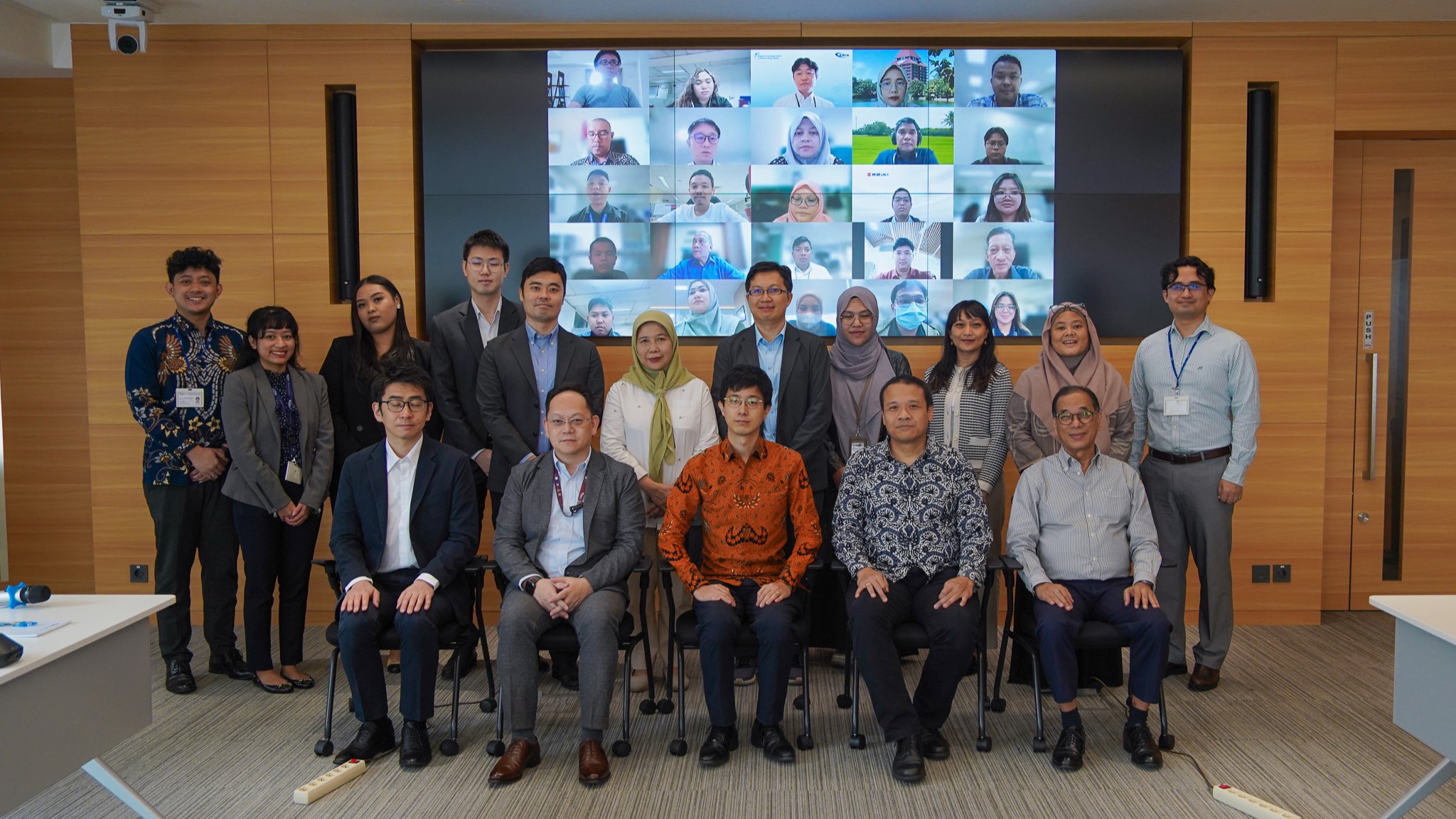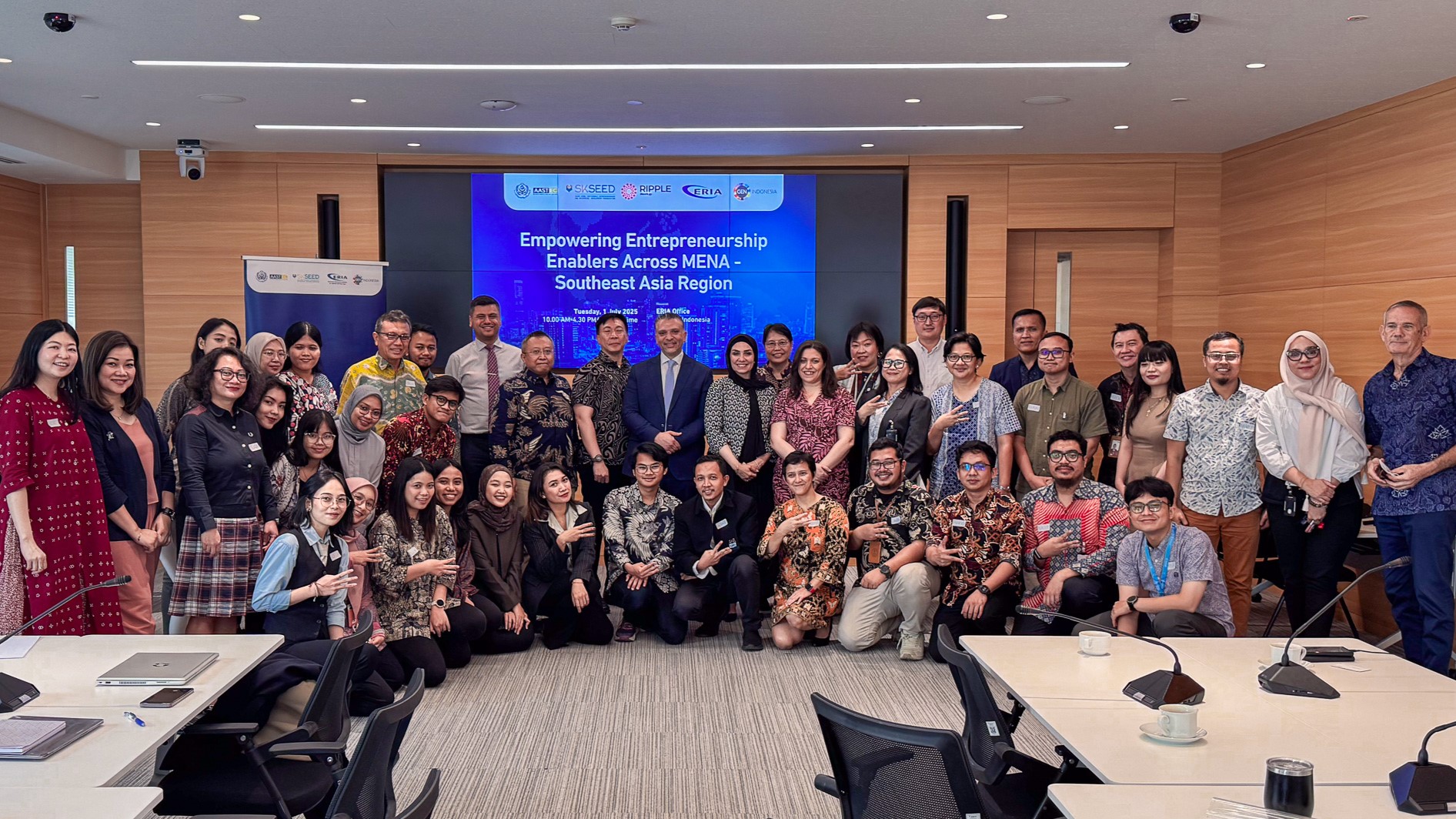DISG Kick-off Webinar: Acceleration of Digital Innovation in ASEAN and Japan's Contribution
Date:
28 October 2020Category:
NewsTopics:
Innovation and Technology, JapanShare Article:
Print Article:
Jakarta, 28 October 2020: ERIA participated in the ‘Kick-off Webinar: Acceleration of Digital Innovation in ASEAN and Japan's Contribution’. The event was the first in a series of webinars on ‘Dialogue for Innovative and Sustainable Growth (DISG)’, a new dialogue framework between ASEAN and Japan. The webinar was held on 28th October 2020 and attracted more than 400 participants from the Asia-Pacific region. Mr. Hachiyama Koji, the Chief Operating Officer (COO) of ERIA, attended the event as one of the speakers.
In the opening remarks, Mr. Hirose Naoshi, Director-General of Trade Policy Bureau of Ministry of Economy, Trade and Industry of Japan, emphasized the importance of strengthening the close relationship between ASEAN and Japan by keeping businesses running and maintaining the flows of trade and investment to mitigate the negative impact of COVID-19. He also mentioned that DISG could bring knowledge cooperation among the experts from various sectors to create solutions for the current crisis which can evolve into greater social and economic achievement.
Four speakers shared their views and perspectives:
- Julia Tijaja, Director, ASEAN Integration Monitoring Directorate, ASEAN Secretariat (ASEC)
- Taketani Atsushi, Chief Representative for ASEAN, Japan External Trade Organization (JETRO) Bangkok
- Tan Sri Dato' Dr. Mohd Munir Abdul Majid, Chairman, ASEAN-BAC Malaysia and Chairman, CIMB ASEAN Research Institute (CARI)
- Hachiyama Koji, COO, Economic Research Institute for ASEAN and East Asia (ERIA)
Dr. Julia Tijaja, Director of ASEAN Integration Monitoring Directorate of ASEC, provided key insights into the ASEAN Comprehensive Recovery Framework and its concrete action plan as a solution to the issues brought about by COVID-19. She also pointed out that digital transformation would be key to the 4th Industrial Revolution (4IR) and bring substantial productivity to the economy, although it is still necessary to solve the issues, such as digital divides (rural-urban, gender, income level), regulatory requirements, and limited capacity of MSMEs.
Mr. Taketani Atsushi, Chief Representative for ASEAN of JETRO Bangkok, discussed the long and rich trade relationship between ASEAN and Japan especially in terms of investment and creating jobs. He said that Japan emphasizes supply chain resilience and digital technology in ASEAN after the Covid-19 outbreak and that JETRO is supporting Japanese companies to invest in resilient supply chains. He had also presented examples of joint pilot DX projects between ASEAN and Japanese companies to solve socio-economic challenges.
Tan Sri Dato' Dr. Mohd Munir Abdul Majid, Chairman of ASEAN-BAC Malaysia and CARI, pointed out the necessity of ASEAN and Japan collaboration and challenges of ASEAN in adopting 4IR. He emphasized the importance of digital connectivity and trade as well as digitalization of MSMEs, and some priority fields including healthcare. He also mentioned that it was necessary to support countries that were less ready for 4IR because 4IR would impact employment through job replacement and etc.
Mr. Hachiyama Koji, COO of ERIA, highlighted how COVID-19 impacted the utilization of digital technology and its implementation. He introduced several findings in recent ERIA research, such as the possibility of leapfrog development (skipping some stages of step-by-step development) and feedback development (traditional industries’ improvement in productivity through digitalization), as well as the necessity of digital human resources development. He also emphasized the importance of Data Free Flow with Trust (DFFT) across countries to take the fullest advantage of digitalization. He mentioned that collaboration of Digital Transformation between ASEAN and Japan should be expanded region-wide, therefore, it is important to establish a foundation for DFFT through building hard infrastructure, legal systems, data commons platforms, consistency of data formats, and compatibility/interoperability to be ready for digitalization collaboration for mutual benefits of ASEAN and Japan. On the potential contribution from Japan in the context of institutional frameworks and regulatory arrangements, Mr. Hachiyama gave his view that one of the challenges is cybersecurity. There are disparities in cybersecurity level among the ASEAN Members States. Therefore, the region needs to narrow the development gap in cybersecurity capability. This is the sector where Japan can support through advanced cybersecurity experience and technology by training with the US in the Indo-Pacific region and ASEAN-Japan Cybersecurity Capacity Building.
During the panel discussion session, moderated by Mr. Kobayashi Hirokazu, Executive Director of JETRO Singapore, the four speakers discussed and provided insight on Japanese companies’ selling points and ideal ways of economic cooperation. They pointed out the followings: (1) Japan has its strength in technology especially in the combination of manufacturing and digitalization; (2) Japanese companies should mentor and engage with the MSMEs and put them into their value chains; (3) Japanese companies can link up with ASEAN digital startups through investing or giving them access to the larger market; and (4) we must remember that digitalization could have a negative impact on people who are not ready for digitalization.







